- Home
- Georgette Heyer
The Reluctant Widow Page 2
The Reluctant Widow Read online
Page 2
‘No, so, indeed, I apprehended,’ he said. ‘It could not have been otherwise.’
She stared at him. ‘Well! This is frank indeed! I am sure I am at a loss to guess why, having engaged me, you should now be so set on turning me away, sir!’
At that he smiled, which made his somewhat forbidding countenance appear very much more pleasing. ‘It is certainly absurd,’ he agreed. ‘You are not what I had expected, ma’am. I must tell you that I think you too young.’
Her spirits sank. ‘I made no secret of my age, sir. I am perhaps older than you imagine. I am six-and-twenty.’
‘You look younger,’ he commented.
‘I hope it need not signify, sir. I assure you, I am not without experience.’
‘You can hardly have had experience of what now lies before you,’ he retorted.
A dreadful suspicion crossed Miss Rochdale’s mind. ‘Good heavens, he is not – he surely cannot be – deranged, sir?’ she exclaimed.
‘No, he is quite sane,’ he answered. ‘It is brandy, not madness, to which the greater part of his propensity for evil is attributable.’
‘Brandy?’ she gasped.
He raised his brows. ‘Yes, I thought you had not been told the whole,’ he said. ‘I am sorry. I intended – and indeed ordered – otherwise.’
Miss Rochdale now realised that not her charge but her employer was mentally deranged. She rose to her feet, saying with a firmness which she hoped concealed her inward alarm: ‘I thank you sir, it would be best that I should present myself without further loss of time to Mrs Macclesfield.’
‘To whom?’ he asked, rather blankly.
‘Your wife!’ she said, retreating strategically towards the door.
He said with unruffled calm: ‘I am not married.’
‘Not married?’ she cried. ‘Then – Have I been under a misapprehension? Are you not Mr Macclesfield?’
‘Certainly not,’ he replied. ‘I am Carlyon.’
He appeared to think that this statement was sufficient to apprise her of all she could possibly wish to know about him. She was wholly bewildered, and could only stammer: ‘I beg your pardon! I thought – But where, then, is Mrs Macclesfield?’
‘I do not think I know the lady.’
‘You do not know her! Is this not her house, sir?’
‘No,’ he said.
‘Oh, there has been some dreadful mistake!’ she cried distressfully. ‘I do not know how it can have come about! Indeed, I am very sorry, Mr Carlyon, but I think I am come to the wrong house!’
‘So it would appear, ma’am.’
‘It is the most mortifying circumstance! I do beg your pardon! But when the servant asked me if I was come in answer to the advertisement I thought – But I should have enquired more particularly!’
‘Did you come in answer to the advertisement?’ he interrupted, his brow creasing. ‘Not mine, I fancy!’
‘Oh, no! I was hired by Mrs Macclesfield to be governess to her children – more particularly, her little boy.’ In spite of herself, she began to laugh. ‘Oh, dear, could anything be more nonsensical? You may conceive what an effect your words had upon me!’
‘I imagine you must have supposed me to be mad.’
‘I did. But it is no laughing matter after all! Pray, where am I, sir?’
‘You are at Highnoons, ma’am. Where do you wish to be?’
‘Mrs Macclesfield’s residence is at Five Mile Ash,’ she an-swered. ‘I hope it may not be far removed from here?’
‘I am afraid it is quite sixteen or more miles to the east of this place,’ he responded. ‘You will hardly reach it to-night.’
‘Good God, sir, what in the world am I to do? I fear she will be much offended, and I am sure I do not know how to explain my folly to her!’
He did not seem to be attending very closely. He asked abruptly: ‘Was there no other female got down from the stage at Billingshurst?’
‘No, there was no one got down but myself,’ she assured him.
‘I suppose her courage deserted her,’ he remarked. ‘It is not surprising.’
‘I collect that you too were expecting someone. It is indeed a chapter of accidents. I wish I knew how to contrive to be well out of such a fix!’
He favoured her with another of his measuring glances. ‘Well, we may yet turn it to good account. Before you decide to present yourself at Five Mile Ash you might do worse than consider the post I have to offer.’
‘You do not require a governess, sir!’
‘No. I require a female – preferably a respectable female – who would be willing, upon terms, to marry a young relative of mine,’ he replied.
She was for several moments deprived of all power of speech. Finding her tongue at last, she demanded: ‘Are you in earnest?’
‘Certainly.’
‘I think you must indeed be mad!’
‘I am not, but I dare say it may appear so.’
‘To marry a young relative of yours!’ she said scornfully. ‘No doubt the gentleman whose evil propensities are attributable to brandy!’
‘Precisely.’
‘Mr Carlyon,’ said Miss Rochdale roundly, ‘I am in no mood for such trifling as this! Be so good as to –’
‘I am not trifling with you, and I am not Mr Carlyon.’
‘I beg your pardon! It is what you told me!’
‘You have my name correctly, but it will be more proper for you to address me as Lord Carlyon.’
‘Oh!’ said Miss Rochdale. ‘Well, that makes it no better, sir!’
‘Makes what no better?’
‘This – this preposterous and ill-timed jest of yours!’
‘My proposal may be preposterous, but it is not a jest. There are reasons why I am anxious to see my cousin married as soon as possible.’
‘I do not pretend to understand you, my lord, but if that is so your cousin would be better advised to offer for some lady of his acquaintance.’
‘Undoubtedly. But his character is too well known to make him acceptable to any female of his acquaintance. Nor has he any longer the recommendation of a respectable fortune.’
‘Upon my word!’ exclaimed Miss Rochdale, hardly knowing whether to laugh or to be indignant. ‘And why, pray, should you suppose that this monster might be acceptable to me?’
‘I don’t suppose it,’ he replied calmly. ‘You may leave him at the church door, if you choose. In fact, I think you should do so.’
‘Either I am dreaming,’ said Miss Rochdale, maintaining her composure with a strong effort, ‘or you are indeed mad!’
Two
He looked a little amused at this, but only replied with a shake of his head. Quite provoked by such conduct, Miss Rochdale said sharply: ‘It does not signify talking! Be so good as to tell me how I may reach Five Miles Ash before it is too late to set out!’
He glanced at the bracket-clock on the mantelpiece, but as this had stopped, drew out his watch. ‘It is already too late,’ he said. ‘It wants only ten minutes to nine.’
‘Good God!’ she exclaimed, turning quite pale. ‘What am I to do?’
‘Since I appear to have been in some sort responsible for your predicament you will do best to trust me to provide for you.’
‘You are very obliging, my lord,’ she retorted, ‘but I prefer not to place my trust in one whose senses are clearly disordered!’
‘Don’t be foolish!’ he replied, in much the same tone as she might herself have used in addressing a troublesome child. ‘You know very well that my senses are not in the least disordered. You will do well to sit down again while I procure you some refreshment.’
His manner had the effect of soothing her exasperated nerves, and she could not but acknowledge that his offer of refreshment was welcome. She had not eaten since the morning. She went back to her c
hair, but said suspiciously: ‘I do not know how you may mean to provide for me, for I am certainly not going to marry your cousin!’
‘That is as you wish,’ he returned, tugging at the bell-pull.
‘From what I have seen of your establishment,’ remarked Miss Rochdale waspishly, ‘that bell is very likely broken.’
‘More than probable,’ he agreed, walking towards the door. ‘But this is not my establishment.’
Miss Rochdale put a hand to her brow. ‘I begin to think my own senses are becoming disordered!’ she complained. ‘If this is neither your house nor Mrs Macclesfield’s, whose, pray, is it?’
‘My cousin’s.’
‘Your cousin’s! But I cannot remain here!’ she cried. ‘You cannot mean to keep me here, sir!’
‘Certainly not. It would be quite ineligible,’ he said, and left the room.
Wild ideas of precipitate flight crossed Miss Rochdale’s mind, but since she did not want for common sense, she rejected them. To be wandering about an unknown countryside all night would scarcely ameliorate her difficulties, and although her host’s behaviour might be extraordinary he did not appear to entertain any notion of constraining her against her will. She sat still therefore, and waited for him to reappear.
This he presently did, saying as he entered the room: ‘There seems to be nothing but cold meat in the house, but I have ordered them to do what they can.’
‘Some tea and bread-and-butter is all I require,’ she assured him.
‘It will be here directly.’
‘Thank you.’ She drew off her gloves, and folded them. ‘I have been wondering what to do for the best. Is there any carriage, or post-chaise, perhaps, which I might hire to convey me to Five Mile Ash, sir?’
‘As to that, I would convey you in my own carriage, but you will hardly endear yourself to your future employer by arriving at midnight.’
The truth of this observation most forcibly struck her. The image of the redoubtable Mrs Macclesfield rose before her mind’s eye, and almost caused her to shudder.
‘There is a decent inn at Wisborough Green where you may put up for the night,’ he said. ‘In the morning, if you are determined to stick to your purpose, I will have you driven to Five Mile Ash.’
‘I am very much obliged to you,’ she faltered. ‘But what shall I say to Mrs Macclesfield? The truth will not serve: she would think it fantastic!’
‘It will certainly be awkward. You had better tell her that you mistook the day, and have but this instant arrived in Sussex.’
‘I am much afraid that she will be justly angry, and perhaps turn me away.’
‘In that case, you may return to me.’
‘Yes! To be married to your odious cousin!’ she said. ‘I thank you, I am not yet reduced to such straits!’
‘You are the best judge of that,’ he replied imperturbably. ‘I am naturally not very conversant with the duties a governess is expected to perform, but from all I have heard I should have supposed that almost anything would be preferable.’
There was so much truth in what he said that she was obliged to suppress a sigh. She said in a milder tone: ‘Yes, but not marriage to a drunkard, I assure you.’
‘He is not likely to live long,’ he offered.
She began to feel a good deal of curiosity now that her alarm had been allayed, and looked an enquiry.
‘His constitution has always been sickly,’ he explained. ‘If he does not meet his death through violence, which is by no means improbable, the brandy will soon finish him.’
‘Oh!’ said Miss Rochdale weakly. ‘But why do you wish to see him married?’
‘If he dies unmarried I must inherit his estate,’ he answered.
She could only stare at him. Happily, since she was for the moment unable to find words to express her bewilderment, the servant came into the room just then, with a tray of tea, bread-and-butter, and cold meat, which he set down on the table beside her. He looked towards Carlyon, and said in a worried voice: ‘Mr Eustace is not come in yet, my lord.’
‘It is of no moment.’
‘If he is not in some scrape!’ the man murmured. ‘He went off in one of his quirks, my lord.’
Carlyon shrugged his disinterest. The servant sighed, and withdrew. Miss Rochdale, having drawn up her chair to the table, and poured out a cup of tea, addressed herself gratefully to the cold mutton, and began to feel more able to grapple with her circumstances. ‘I should not wish to appear vulgarly inquisitive, my lord,’ she said, ‘but did you say that you would inherit the estate if your cousin were to die unwed?’
‘I did.’
‘But don’t you wish to inherit it?’ she demanded.
‘Not at all.’
She recruited herself with a sip of tea. ‘It seems very odd!’ was all she could think of to say.
He came up to the table, and took a chair opposite her. ‘I dare say it may, but it is the truth. I should explain to you that I was for five unenviable years my cousin’s guardian.’ He paused, and she saw his lips tighten. After a moment, he continued in the same level voice: ‘His career at Eton came to an abrupt end, for which most of his paternal relatives held me to blame.’
‘Why, how could that be?’ she asked, surprised.
‘I have no idea. It was commonly said that if his father had not died during his infancy, or if my aunt had appointed one of her brothers-in-law to be his guardian in preference to myself, his disposition would have been wholly different.’
‘Well, to be sure, that seems very hard! But – pardon me! – was it not strange that you should have been chosen to be his guardian? You must have been very young!’
‘Your own age. I was six-and-twenty. It was natural enough. My aunt was my mother’s elder sister; she inherited this estate from grandfather. My own estates lie within seven miles of it, and the intercourse between our two families had been constant. I had myself been fatherless for many years, a circumstance that perhaps made me older than my years. I found myself, at the age of eighteen, the head of a family whose youngest members were still in the nursery.’
‘Good heavens, do not tell me you were called upon to take charge of a family at that age!’ Miss Rochdale exclaimed.
He smiled. ‘No, not quite that. My mother was then living, but she did not enjoy good health, and it was natural that they should look to me.’
She regarded him wonderingly. ‘They?’
‘I have three brothers, and three sisters, ma’am.’
‘All in your charge!’
‘Oh no! My sisters are now married; one of my brothers is on Sir Rowland Hill’s staff, in the Peninsula; another is secretary to Lord Sidmouth at the Home Office, and in general resides in London. You may say that I have only the youngest on my hands. He is in his first year at Oxford. But at the time of which I speak they were all at home.’ The smile again lit his eyes. ‘Your own experience must tell you, ma’am, that a family of six, ranging in age from infancy to sixteen years, is no light burden to cast upon a delicate female.’
‘No, indeed!’ she said feelingly. ‘But you had tutors – governesses?’
‘Yes, I lost count of them,’ he agreed. ‘Two of my brothers had the most ingenious ways of getting rid of their preceptors. But I do not know why I am boring on about my affairs, after all! I meant merely to explain how it was that my aunt came to leave her son to my care. I must confess that I most signally failed either to curb his inclination for all the more disastrous forms of dissipation, or to influence him in any way for the better. I only succeeded in giving him a profound dislike of me. I cannot blame him: his dislike of me can be nothing compared with the sentiments I have always cherished in regard to him.’ He looked across the table at her, and added with deliberation: ‘It is not an easy task to deal fairly with a youth for whom you can feel nothing but contempt and dislike, ma’am. One of my c
ousin’s uncles would tell you that I was always hard on him. It may have been so: I did not mean to be. When I was obliged to remove him from Eton, I put him in charge of an excellent tutor. It did not answer. A great noise was made over my refusal to entertain the notion of letting him go to Oxford. There was, in fact, little likelihood of his proving himself eligible, but on every count I should have opposed it. I was held, however, to have acted from spite.’
‘I wonder you should have listened to such ill-natured nonsense!’ Miss Rochdale observed, quite hotly.
‘I did not. After various vicissitudes, the boy took up a fancy to enter the Army. I thought if he could be removed from the society that was ruining him there might be some hope of his achieving respectability, so I bought him a pair of colours. I was instantly held to nourish designs on his inheritance, and to have chosen this way of putting a period to his existence. Happily for my reputation, he was asked to send in his papers before he had seen any active service. By that time he was of age, and my responsibility had come to an end.’
‘I am astonished you should not have washed your hands of him!’
‘To a great extent I did, but as his interpretation of our relationship included a belief that he was at liberty not only to pledge my credit, but to attach my signature to various bills, it was a trifle difficult to ignore him.’
She was very much shocked. ‘And his paternal relatives blame you! Upon my word, it is too bad!’
‘Yes, it becomes a little wearisome,’ he acknowledged. ‘I blame myself for having lent a certain amount of colour to their suspicions by once taking up a mortgage on part of the unencumbered land. I really meant it for the best, but I should have known better than to have done it. Were he to die now, and his property to come into my hands, it would be freely said in certain quarters that I had not only encouraged him to commit all the excesses that led to his end, but had, by some unspecified means, prevented him from marrying.’
‘I own it is very disagreeable for you,’ she said, ‘but I am persuaded your own family, your friends, would not believe such slander!’

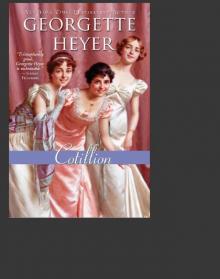 Cotillion
Cotillion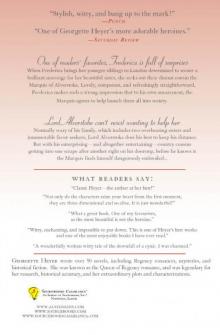 Frederica
Frederica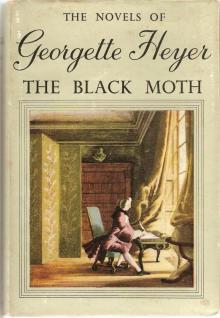 The Black Moth: A Romance of the XVIIIth Century
The Black Moth: A Romance of the XVIIIth Century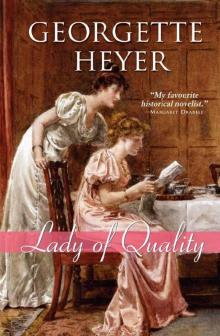 Lady of Quality
Lady of Quality Snowdrift and Other Stories
Snowdrift and Other Stories An Infamous Army
An Infamous Army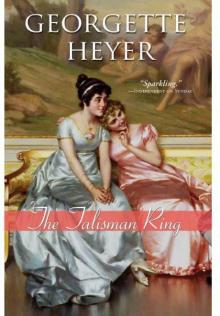 The Talisman Ring
The Talisman Ring Venetia
Venetia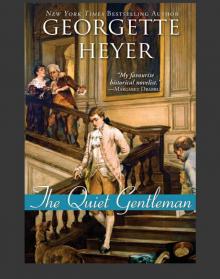 The Quiet Gentleman
The Quiet Gentleman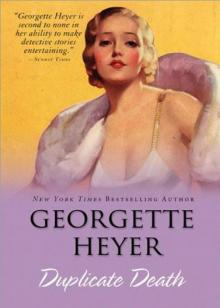 Duplicate Death
Duplicate Death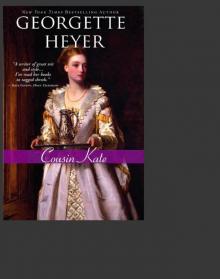 Cousin Kate
Cousin Kate Black Sheep
Black Sheep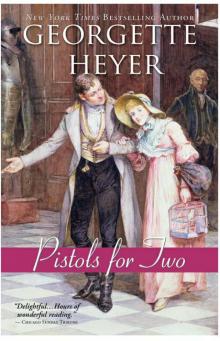 Pistols for Two
Pistols for Two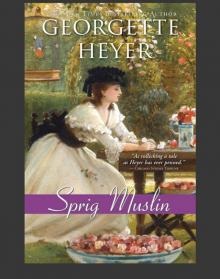 Sprig Muslin
Sprig Muslin No Wind of Blame
No Wind of Blame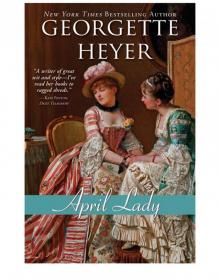 April Lady
April Lady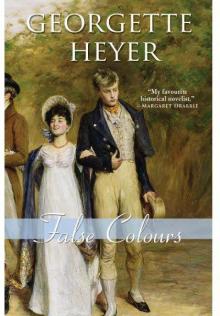 False Colours
False Colours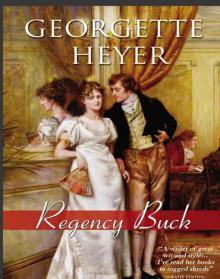 Regency Buck
Regency Buck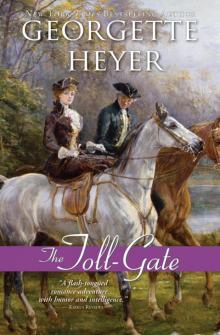 The Toll-Gate
The Toll-Gate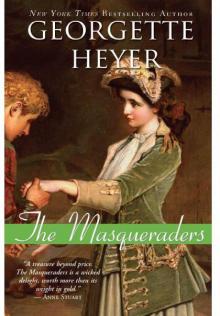 The Masqueraders
The Masqueraders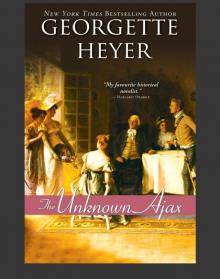 The Unknown Ajax
The Unknown Ajax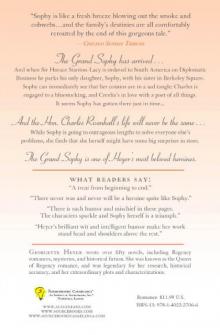 The Grand Sophy
The Grand Sophy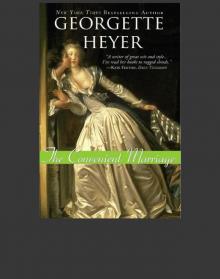 The Convenient Marriage
The Convenient Marriage Faro's Daughter
Faro's Daughter The Conqueror
The Conqueror The Foundling
The Foundling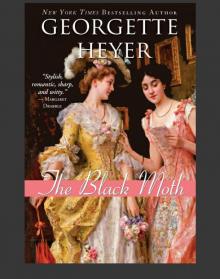 The Black Moth
The Black Moth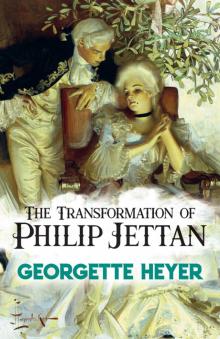 The Transformation of Philip Jettan
The Transformation of Philip Jettan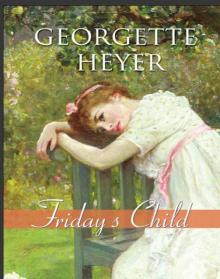 Friday's Child
Friday's Child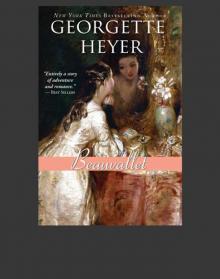 Beauvallet
Beauvallet They Found Him Dead
They Found Him Dead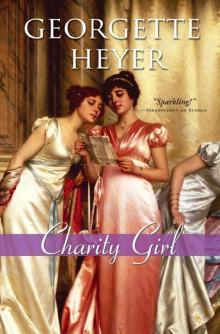 Charity Girl
Charity Girl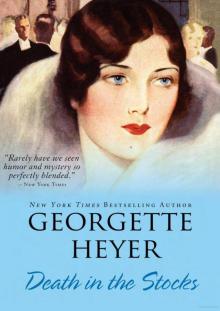 Death in the Stocks: Merely Murder
Death in the Stocks: Merely Murder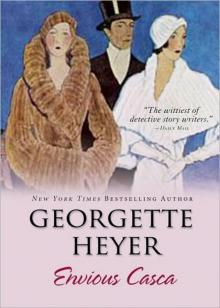 Envious Casca
Envious Casca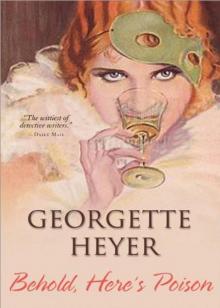 Behold, Here's Poison
Behold, Here's Poison Arabella
Arabella The Nonesuch
The Nonesuch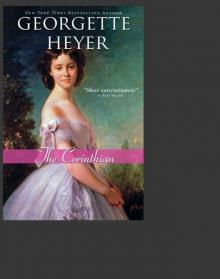 The Corinthian
The Corinthian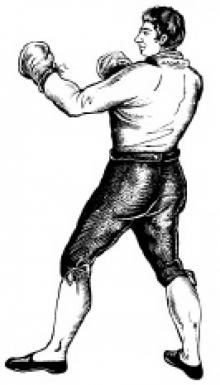 Jennifer Kloester
Jennifer Kloester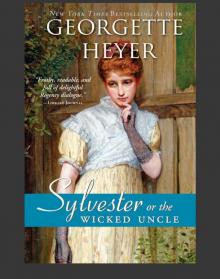 Sylvester
Sylvester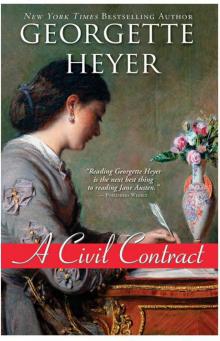 A Civil Contract
A Civil Contract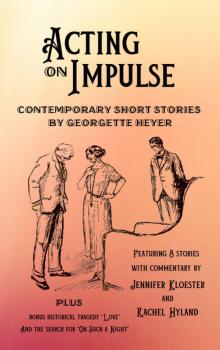 Acting on Impulse
Acting on Impulse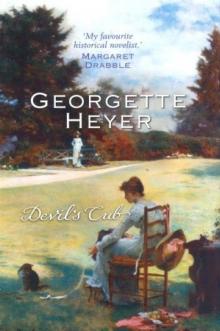 Devil’s Cub at-2
Devil’s Cub at-2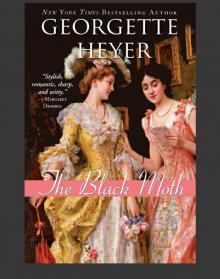 Black Moth
Black Moth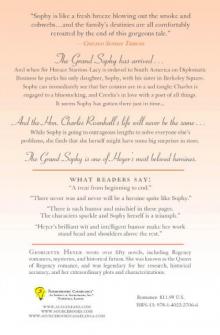 Grand Sophy
Grand Sophy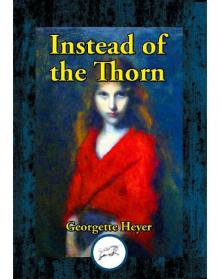 Instead of the Thorn
Instead of the Thorn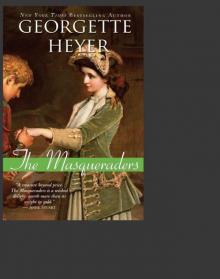 Masqueraders
Masqueraders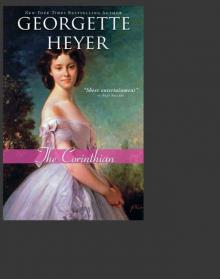 Corinthian
Corinthian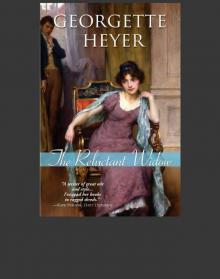 Reluctant Widow
Reluctant Widow